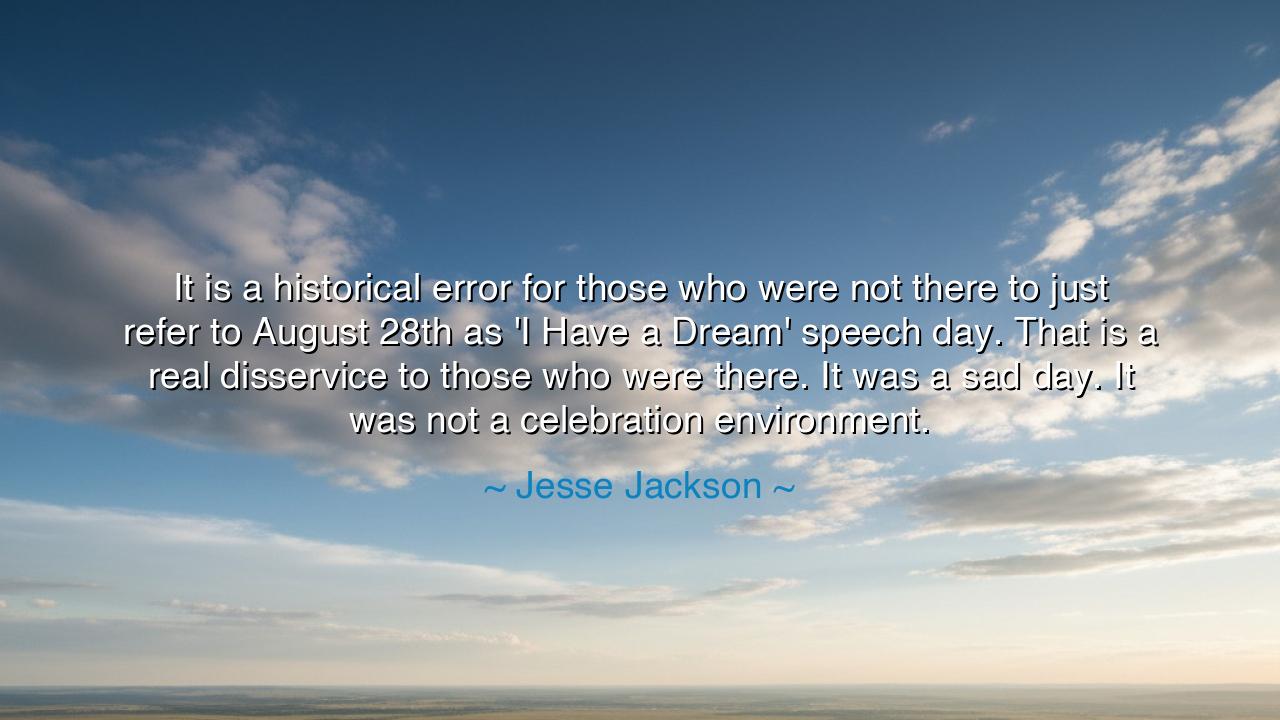
It is a historical error for those who were not there to just
It is a historical error for those who were not there to just refer to August 28th as 'I Have a Dream' speech day. That is a real disservice to those who were there. It was a sad day. It was not a celebration environment.






Jesse Jackson once spoke with the gravity of memory and the authority of witness when he said: “It is a historical error for those who were not there to just refer to August 28th as ‘I Have a Dream’ speech day. That is a real disservice to those who were there. It was a sad day. It was not a celebration environment.” His words pierce through the comforting fog of nostalgia and bring us face to face with the truth of history—that the March on Washington, remembered by many as triumphant, was born of sorrow, struggle, and sacrifice. Jackson reminds us that to remember only the poetry is to forget the pain; to celebrate only the dream is to ignore the nightmare from which it arose.
The origin of this quote lies in the reflections of one who stood among the weary, the hopeful, and the oppressed on August 28, 1963. The March on Washington for Jobs and Freedom is often recalled through the shining words of Dr. Martin Luther King Jr., whose “I Have a Dream” speech has become a symbol of moral grandeur and unity. Yet for those who lived that day, the air was thick not only with inspiration, but with grief. The marchers came not in triumph, but in protest; they carried wounds inflicted by centuries of slavery, segregation, and systemic cruelty. Jackson, a young man then, saw faces marked by hunger and hardship. He knew that behind the eloquence of the dream lay the anguish of reality—a nation divided, a people denied their humanity.
In the ancient style of truth-telling, Jackson’s statement serves as both rebuke and reminder. He warns against the tendency of later generations to romanticize the struggles of their ancestors—to turn suffering into spectacle, and protest into pageantry. Just as some remember the crucifixion only through the cross’s beauty and not its agony, many remember that day in Washington as a festival of unity rather than an outcry against despair. Yet the wise know that no dream worth having is born without tears. To honor history truthfully is not to polish it until it shines, but to keep its wounds visible, so that we may never forget what healing costs.
History gives many mirrors to this truth. Consider Nelson Mandela’s release from prison after 27 years—a moment now celebrated as joyous, yet one that was steeped in pain. Those who saw him walk free knew it was not the end of suffering but the continuation of struggle. His freedom came at the price of countless lives, untold sacrifices, and the torment of a nation. So too with August 28th: the speech that gave America hope also came at the height of fear and division. Jackson’s lament reminds us that true remembrance must include both the glory and the grief, for only then does it possess integrity.
There is a deeper wisdom in his sorrow. By calling that day “sad”, Jackson does not diminish its greatness—he restores its humanity. He reminds us that the marchers were not saints but ordinary men and women trembling under the weight of injustice, daring to believe in a vision they could not yet see. Their tears were the ink in which King’s dream was written. Their pain was the soil in which freedom would later take root. To call that day merely a celebration is to erase their courage—to take from them the dignity of endurance and replace it with the illusion of ease.
In his words, Jackson also offers a warning to the generations that follow. When we sanitize history, we rob it of its power to teach. If we remember only the dream, we will not see the chains it sought to break. If we remember only the speech, we will forget the silence that preceded it—the silence of those unheard, unseen, and unnamed. The sadness of August 28th was the sadness of a people who had given everything and were still waiting to be free. To honor them is to continue their work, not to freeze it in marble and applause.
So let this teaching be carried forward: remember history not as it comforts you, but as it commands you. When you recall the dream, recall also the struggle. When you speak of King’s words, remember the thousands who marched without knowing if they would return home. And when you celebrate progress, do so with reverence, not forgetfulness. For the truth of August 28th is not only that a man spoke of a dream—it is that a people, bound by sorrow, dared to believe in one. And that courage, born of sadness, is what truly makes that day holy.






AAdministratorAdministrator
Welcome, honored guests. Please leave a comment, we will respond soon